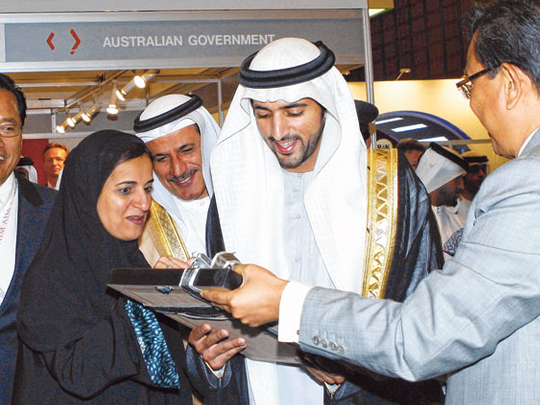
Dubai: Foreign Direct Investment (FDI) in the UAE is believed to have reached $13.7 billion (Dh50.32 billion) in 2010, Alessandro Golombiewski Teixeira, president of the World Association for Investment Promotion Agencies, said at the Annual Investment Meeting (AIM) being held in Dubai.
However, according to the UAE Ministry of Foreign Trade, FDI in the UAE was as high as $15 billion.
Teixeira said: "The FDI in the UAE is expected to get back to its peak of a few years ago."
He added that global FDI flow would grow from $1.5 trillion in 2010 to $1.8 trillion in 2014.
FDI in the Middle East is expected to jump to $60 billion in 2010.
The meeting was inaugurated yesterday by Shaikh Hamdan Bin Mohammad Bin Rashid Al Maktoum, Crown Prince of Dubai and Chairman of the Dubai Executive Council, and was attended by Shaikha Lubna Al Qasimi, Minister of Foreign Trade, ministers, senior government officials and executives and businessmen from around the world.
Shaikha Lubna said: "FDI is a driving force in the globalisation process, which has become a key factor in the modern world economy."
Indications of recovery
Though FDI levels have declined significantly over the past few years due to the global recession, she said, there are indications of recovery and pointers to a more positive future, especially in the medium and long terms.
"The United Nations Conference on Trade and Development (UNCTAD) initially estimated a 13.2 per cent increase in world FDI flow to $1.34 trillion in 2010, compared with $1.189 trillion in 2009," Shaikha Lubna said.
She praised the favourable business and investment climate in the country that offers multiple benefits to investors. "These have made our country home to the regional operations for over 25 per cent of the top 500 companies in the world," Shaikha Lubna said.
She added that the government was developing a number of trade, investment and economic laws to further enhance the local investment environment.
It is also working on strengthening the competitiveness of the UAE, one of the most dynamic economies in the region, through the initiatives of the Emirates Competitiveness Council and other related authorities.
"The efforts of these organisations have been instrumental in many of the UAE's achievements, such as ranking 25th out of 139 countries in the Global Competitiveness Report issued by the World Economic Forum in 2010, 40th out of 183 countries in the Doing Business Report issued by the World Bank, and first among Arab countries and 16th worldwide in the Global Trade Enabling Report 2010 issued by the World Economic Forum," she said.
Teixeira, a deputy minister in the Brazilian government, said FDI was expected to increase greatly in the Middle East.
"While the size of FDI in the Middle East represents 1.5 per cent [of the global total], it is expected to grow to six per cent in 2012," he said.
Pointing out the benefits of an advanced economy in any country, Teixeira said: "We cannot build social, educational and cultural solidarity without econ-omic sustainability."
He said that in the last nine years Brazil has created 40 million jobs by developing a large internal market, which helped Brazil to be among the first countries to come out of the recession.












